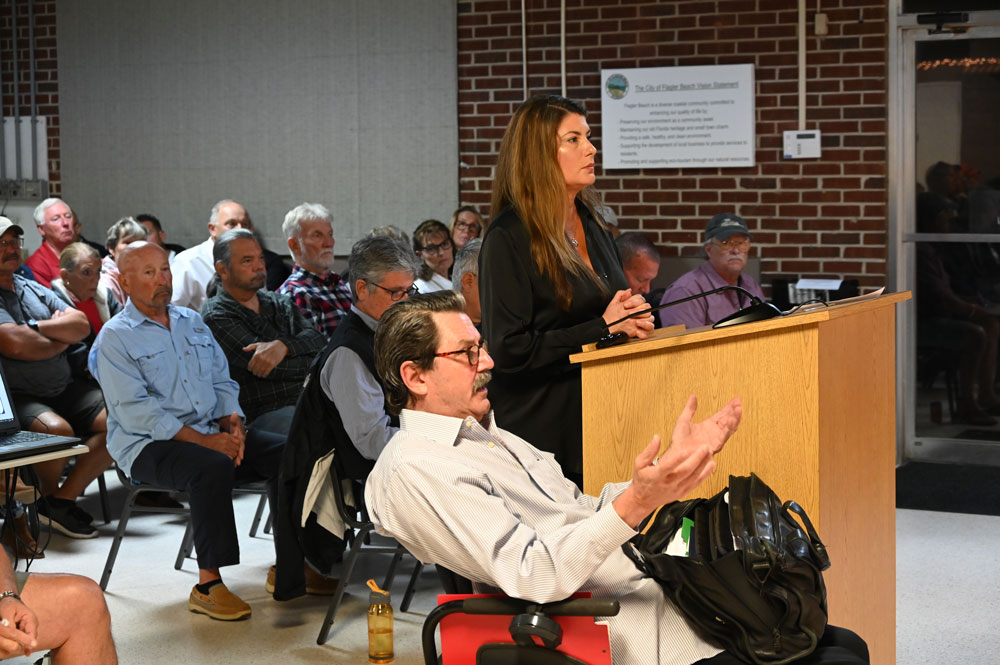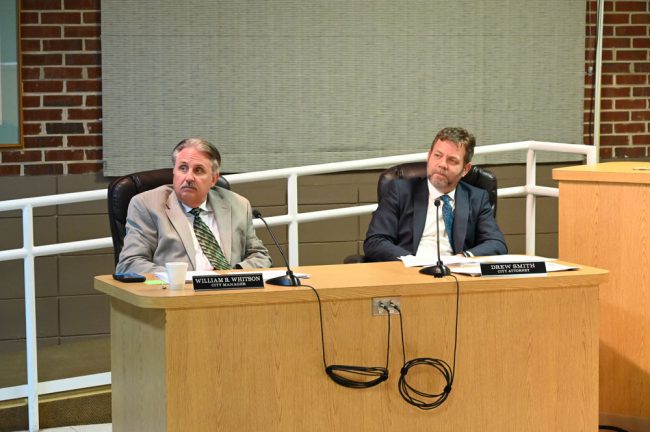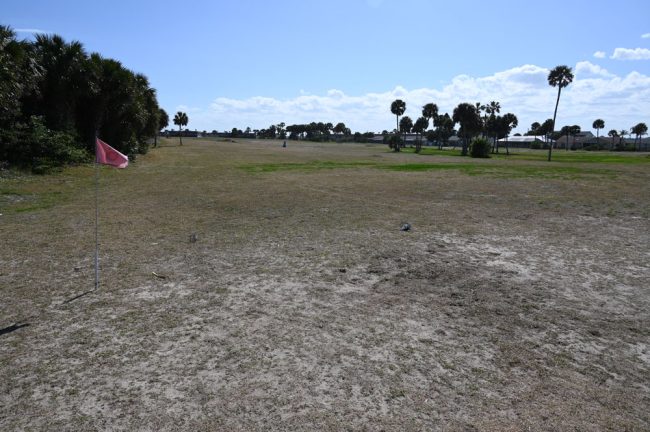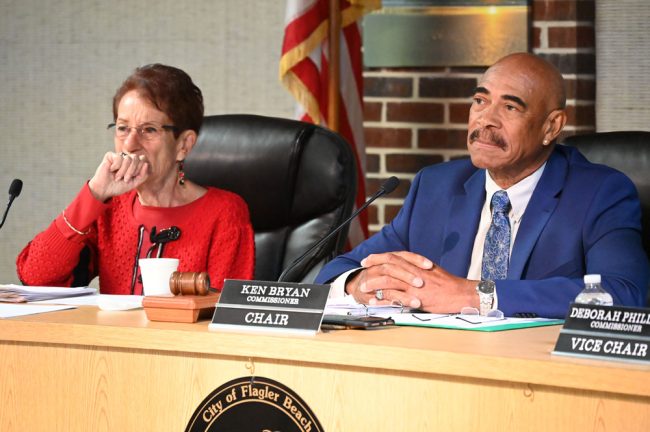
Seven years into a rocky marriage that never lived up to its promise and twice before verged on dissolution, the Flagler Beach City Commission Thursday evening finally ended its relationship with Flagler Golf Management, the company that since 2015 had managed Ocean Palms Golf Club, the city-owned, nine-hole golf course framed by scores of homes at the south end of town.
“From what I can see over all these years, we as a commission,” Commission Chairman Ken Bryan said, “we have not been doing our job as far as holding the lessees to the fire to what they’re supposed to have been doing within the contents of the lease. And that’s what I have a severe problem with.”
The commission directed its administration to seek out a new management company through a request for proposals. The city got three responses when it issued an RFP in 2015, but only Flagler Golf Management ended up making a presentation to the city as the other two firms dropped out in a process even then fraught with recriminations. Flagler Golf Management, in other words, won the bid by default.
It was not a good start. It got worse. The course opened in 2016, in time for Hurricane Matthew that year, Hurricane Irma the next, and a major drainage project the city build, cutting through the course in 2017 even as other problems arose between the city and the company. The lease called for proper accounting practices, including quarterly financial reports due the city. Flagler Golf Management never complied.

“All that was required from the golf course was to send us their sales tax return 15 days after it was filed, and every quarter to produce financials for us,” Kathleen Doyle, the city’s finance director, said. “For the whole entire time of this lease, that has never been done, unless I took the time–and nowhere in the lease does it say that the finance director needs to remind you to do this. I would have to call the manager, at the time Terry McManus, and the last time I reached out to him it was April 7, and 18 emails and six weeks later I finally got a financial report from March 30 of 2021.”
So it’s been. That sort of pyrrhic performance was the ultimate undoing of the company and the lease. Since early summer, the city had sought basic documentation of the company’s books for what was to be a $12,000 audit. Auditors never got what they needed (they charged the city $400). “We are tired of chasing the data,” City Manager William Whitson said. Most commissioners echoed Commissioner Deborah Phillips’s disbelief at the company’s lack of proper record-keeping down to basic sales tax data, which is required by law.
Even Thursday evening, as Bruce Godwin, a company investor whose name and person emerged for the first time Thursday, defended the company’s practices to the commission, he often appeared confused, overwhelmed, surprised and blindsided by the questions and numbers city officials were throwing at him. He had finally to concede that the company hadn’t complied with the city’s 30-day ultimatum to produce all necessary documentation, in proper form: “I clearly haven’t cured it per the satisfaction of the city of Flagler and I understand that it in writing,” Godwin said. “There are a lot of things in there I have absolutely no knowledge of.” He was referring to a memo prepared by the city’s finance director, a mini-city audit of the company’s books, illustrating the maze and haze of Flagler Golf Management’s numbers. Godwin was illustrating it in his own responses to commissioners’ questions.

Godwin fielded most of the questions from commissioners in a 90-minute hearing, with Tiffany McManus, the new owner of the company, only rarely speaking, and surprisingly speaking little to advocate for a lease that was essentially crumpling before her eyes. “I wasn’t involved previously. So I really would like a chance to show you how great it can be, and what my original vision of the golf course was,” she told commissioners in what would prove to be her one of her only substantial statement of the evening.
A half dozen people in a nearly-full chamber spoke in strong support of the company. Most were neighbors of the club, which over the years unquestionably developed a tight-knit community of customers, advocates and even volunteers, the last proving yet one more breach of business rules: a for-profit company is not allowed to use volunteers. McManus and Godwin acknowledged that they were used, and that they got free golf games in return, but Godwin said that was no longer permitted. Neither had been aware of the prohibition on the use of volunteers until the city manager pointed out the issue in a February letter (the ultimatum giving Flagler Golf Management 30 days to shape up.)
Carmelyn Mazanec was a member of the “Alternative Use Committee” the commission had appointed in 2015 to examine proposals for use of the 34-acre grounds. She reminded commissioners–none of whom was on the commission, with the exception of Jane Mealy–of the “wreck” that was the then-disused golf course. “Now I’m finding out that the big flaw is the accounting. This is what the whole thing is going to break the lease over?” she asked commissioners. “Let’s work together. Belle was trying to get herself established. She’s taking over. She is doing everything they could do. They understand your problems. I see a communication problem here between the city and them. Sit down, work it out, figure out a way to work with the accountant and get the books right. Because if that’s what’s ruining the golf course, and that’s the reason you’re getting rid of them, what are you going to do with it after you’re done? Because nobody’s going to take that golf course. We had one person willing to do it. And that was their company.”

Mazanec and others also raised the concern over the city rezoning the acreage, turning it into an extended subdivision, a water park, a go-cart facility. When Ken Bryan, whom commissioners earlier in the evening had just appointed chairman of the commission for the year, explained wy he was ready to end the lease, he assured residents–as did other commissioners–that it would remain a golf course.
“You guys stomped on them with both feet starting four years ago and you hadn’t led up. I don’t get it,” another resident, who seemed on the verge of a breakdown, told commissioners, speaking in defense of the club.
“Please understand that this is not going to turn into any kind of a park or anything like that,” Bryan, whose colleagues had elected chairman of the commission for the year earlier, said. “And our our goal at this point is to ensure that we have an operational golf course with a good company that’s going to actually make this a very, very good golf course that will enhance your property values, and also that somebody wants to be able to enjoy and share.”
Mealy, who knows the history of the course better than anyone at the city, took exception to public criticism that commissioners were contesting “minutiae” or having issues only with accounting practices. Re-elected last Tuesday and sworn-in to her sixth term hours earlier, Mealy then spoke with the kind of forthrightness few officials dare, even taking a swipe at her fellow-commissioner, James Sherman, who had just been sworn in to his first term: “We’re told by some critics of the commission that we don’t know how to run the city like a business. Well, I don’t want to run the city like a business,” Mealy said. (“We have to look at it as a business kind of, we have to run it as a business,” Sherman said of city government, speaking at a candidate forum on Feb. 15.) “However,” Mealy continued, “we do have to follow government accounting practices or we get shut down as a city and then everybody in the city suffers. You want to be part of Palm Coast or Flagler County because we couldn’t keep up our finances? So it’s not only only accounting. That really upset me.” She added: While I would love to work together, it sounds very nice, I think we tried, in 2017, earlier this year and more recently, and I don’t see us working together. I see a lot of excuses.”

What happens next? Legally, Drew Smith, the city attorney, said, there’s enacting the divorce between the two sides. “If it’s amicable, that’s one process. If it’s not amicable, it’s another process and the non-amicable route can delay things on the RFP side,” Smith said.
And beyond? “I get it. There’s this big boogeyman out there. The unknown,” Whitson, the city manager, said. “What’s going to happen? Well, I can tell you that the zoning on the land doesn’t allow for us to put a bunch of condos or racetrack or all the other rumors that are floating around out there. I don’t have time to chase all the rumors that I’ve heard. They’re just not true. The city just closed on the 2.9 acres, where the driving range is being conducted in. We own it now. I signed the paperwork two days ago. So it will be a recreational amenity to the city. It will function as a golf course. How it would do that, should you decide to terminate the lease, I don’t know.” He spoke moments before the 5-0 vote.
“I know what I’m prepared to recommend tonight,” he continued. “But as far as going and doing something wild and crazy with a land or, or building bunch of buildings and all that kind of stuff. That’s just a bunch of nonsense. And it’s not in the city’s best interest to do.” He said he would issue a “proper” request for proposal, RFP “to secure a new operator to operate it properly, professionally and legally according to the terms of the lease and as your manager, I would be responsible for making sure that that happened. I would make sure that it’s properly reviewed. That we have a credible company that could step in the shoes of the management company that’s there. There would be have to be some sort of unwinding of the arrangement we would have with the existing operator. All of those things, I don’t know. I’m no attorney. All I know is, I have gone through this kind of thing before in another community. And the way we did it was issue with RFP and we got plenty of people to choose from, when we went out and did it properly. I don’t have a crystal ball to say we’re going to get 15 proposals or two. But I know how to do this, and I do assure the commission that we are quite ready to move forward with a plan of action based on your direction.”
Moments later, Whitson got his direction, if after a tortuous wrangling through motion language that at times made the commission sound like Flagler Golf Management’s accounting language. But the 5-0 vote was finally taken, without hesitation from any of the commissioners. The commission was only half-way through what would prove to be a six-hour meeting. It took a break. McManus and Godwin quickly left.
![]()





























Steve says
They never should have been in the business of Golf Course Management IMO
Mark says
Sounds like it was bound to fail from the start. Two Hurricanes, City drainage project, lack of communication in both directions and through a Pandemic to boot. Yes the accounting practices were bad and it’s not the job of the city to remind them but a nudge was probably needed a few years ago before it got to this. How many other business’ are in compliance in their accounting practices, guarantee it’s not 100%. Hopefully another company does step up to run it, if not they may want to revisit this with Belle McManus.
John Stove says
Business and Government basic 101 class…..you have to keep documentation, records and receipts at all times. NO EXCUSES
If you are paid to do something and in your contract it says you have to deliver something by the end of each month or whatever, you better deliver it……whats the problem?
Sorry, I dont feel sorry for a business that cant grasp that basic concept
Concerned Citizen says
RFP’s are the way to go.
But keep it honest. Keep everything visible to the citizens of Flagler beach. Provide regular updates and workshops. When it boils down to your final three hold public meetings with the candidates. Handle it like a job interview if you will.
Yes this is extra work. But needed to restore faith in city government at the moment. For years this county in general has done numerous back room deals. They make promises in the dark and one sided agreements that turn around and back fire every time. This shoukd be a learning lesson for all involved.
Every business that enters this county regardless of location deserves an honest and fair chance. One sided deals that back fire are wasteful. It wastes time the Commision could better have spent somewhere else. And that in turn will cost you votes because eventually your constiuents tire of it.
We have a new face on the concil this year. Maybe Mr. Sherman can step in and keep this entire process ethical and honest. As well as transparent.
When a new vendor is brought in to manage the course hold them accountable. Random audits and inspections should be the order of the day. And swift discipline when not in compliance. You have active code enforcement. Utilize them if needed.
Time to get that course back to operational status. And give the City something to enjoy.
Motherworry says
I sat through numerous meetings regarding the Golf Course. Know this, folks weren’t kicking in the door to operate a closed down, grown over Golf Course. RFP’s? I think 2 RFP’s were advertised, with 2 response’s only one was viable. The city signed with them and the rest was history. This was done with full transparency, with no backroom deals. There were more eyes on this project than you can imagine. To suggest as you have, that there was something underhanded done is frankly BS.
Concerned Citizen says
I worked in the area for several years.
And saw a lot of the goings on talked about. And the fact that it took this long to address it after non compliance speaks for itself.
While the initial transaction may have been done with full transparency the city def let a lot slide there. Once they started to let stuff slide and not enforce rules that would have been enforced for other busniesses then it put them in an akward position. This went back and forth for to long.
When the new owners come in busniess needs to be conducted above board from day one.
Crusty Old Salt says
Well said Motherworry. I followed the process through also. Agree with you 100%.